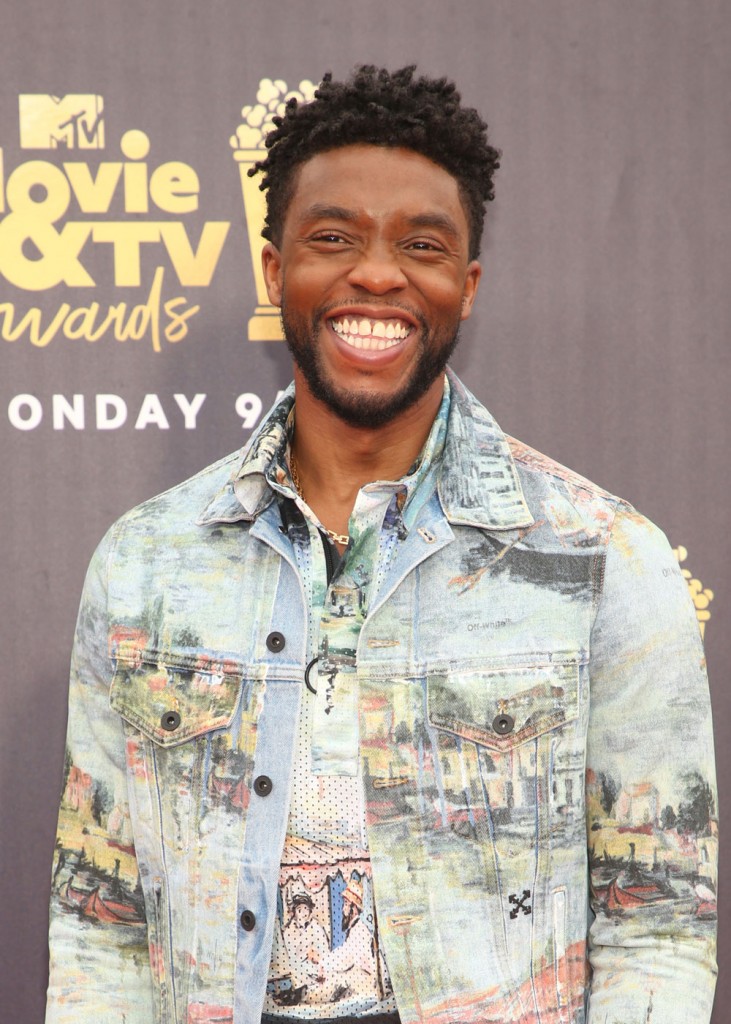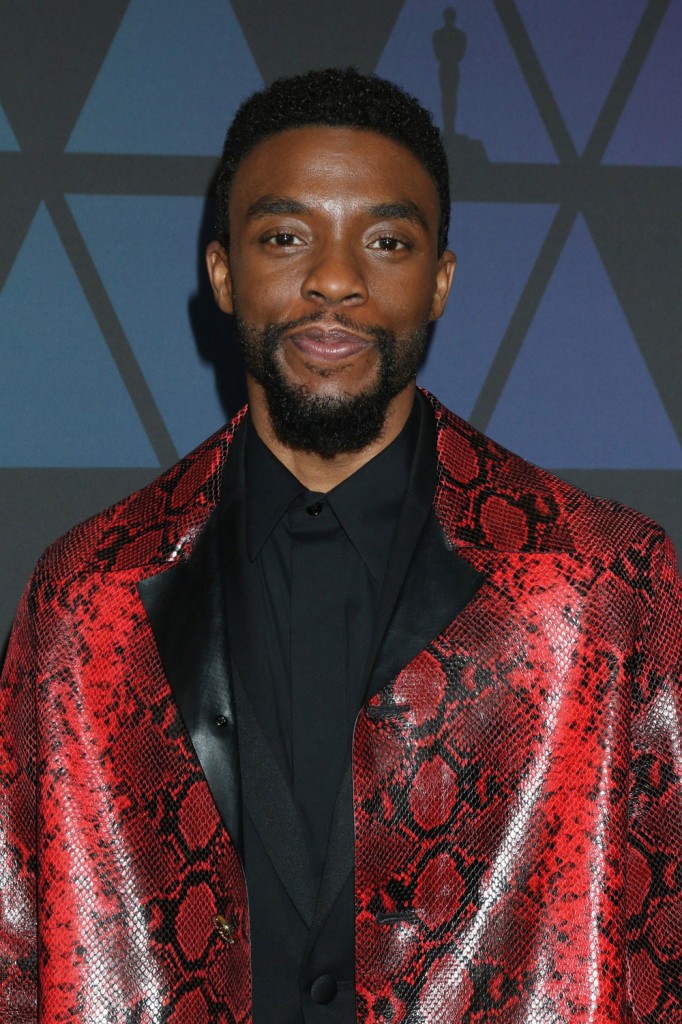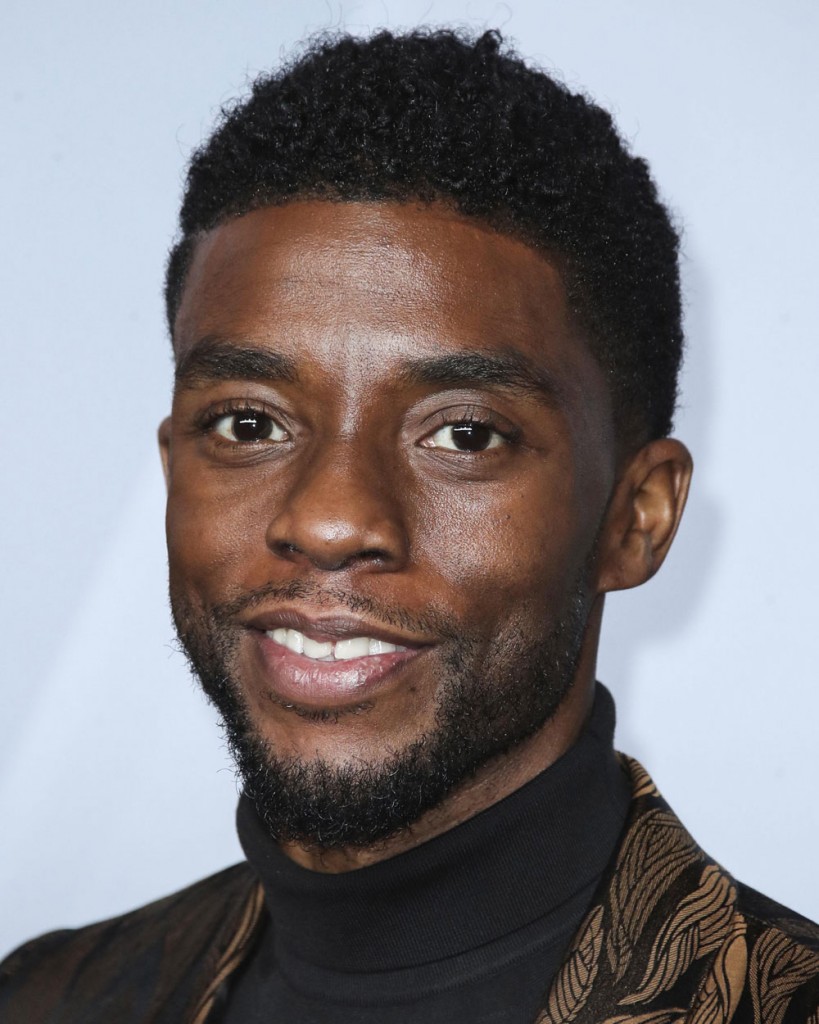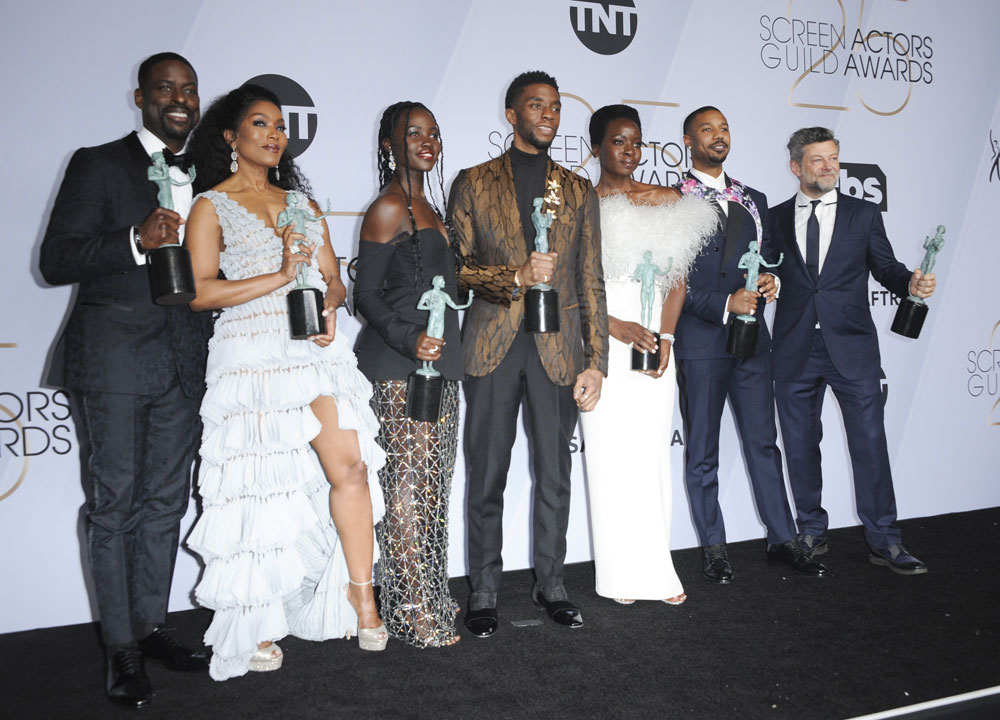
The surprise win for Black Panther at the SAGs gave a lot of us hope that it could win Best Picture at the Oscars. The Academy is older and whiter than the SAG and that’s probably not going to happen, but we can still dream. Moonlight won over La La Land after all. Chadwick Boseman, 41, gave the speech on behalf of the cast at the SAGs. He said they were asked two questions most often during press for the film. 1. Did they know what a success it would be? and 2. Has the success of BP changed the industry? His answer was thought-provoking “To be young, gifted and black. We all know what it’s like to be told that there’s not a place for you to be featured…. We know what it’s like to be beneath and not above. We knew we could be full human beings in the role that we were playing [in this movie].” It gave me goosebumps. Backstage, during the post-win Q&A, he was asked to explain what it means “to be young, gifted and black” and his answer moved me. This is what we’ve heard before but he explained it so well that he got applause from the journalists there. That’s in the video below and I’ve transcribed it:
American Urban Radio Networks asked him to expand on being young, gifted and black
That is one of my favorite songs, one of my favorite sayings in poetry. It speaks to the fact that you have the same dreams as other people. You have equal if not more talent. But you don’t have the same opportunities. You don’t necessarily have the same doors open to you, the same nepotism, the same money or resources that can be put toward your dreams. You, a lot of times, don’t have family members that have ever achieved the things that you want to do. So when you aspire to do something [it] is outside the realm of what the world would see you doing and also what your family has ever achieved. Some people they’re the first person to graduate from college still [in their family]. To be young, gifted and black is all of that. It’s to have everything but not be able to grasp it, but to be able to persevere through that.All of us are actors. It is difficult to do that for everyone, it’s a difficult task, but our task historically has not been the same because we’ve been relegated to playing the sidekick or the sideshow or backstage.
That was powerful. I’ve seen white people whom I know (I’m white) so closed to the concept of privilege that they explain over and over how hard they have it, how they’ve been harrassed by cops, how they grew up poor. Most of them will never get it. I’ve also seen other white people, mostly young but some old (my parents!), understand that it’s a fact. The way Chadwick explained being young, gifted and black, as not having the same starting point and safety net, is so simple and yet so important. There’s also the issue that he shouldn’t have to spell this out for people, but unfortunately we’ve seen time and again that those who benefit from white supremacy want to deny and perpetuate it.
Chadwick’s comments start at 6:20 into this video:
Photos credit: Avalon.red and WENN














Thank you, Chadwick.
And thank you Lorraine Hansberry who wrote those words originally and to Nina Simone who turned them into an incredible anthem.
He is one cool cat.
I love the way he dresses on the red carpet. So sharp!
My dad, a 70 year old white farmer, gets white privilege, though he wouldn’t put it in those terms. He put it best during a conversation about Trump. I said, hypothetically, “Can you imagine if Trump was black?” His response was, “He couldn’t be black. No black guy gets away with 6 bankruptcies and still gets to be a billionaire.” White privilege in a nutshell.
Older folks can get it. Most just don’t want to.
You got that right. I stumbled across an argument on a local FB chatter page and holy hell the resistance to white privilege by one woman especially was unreal. People kept trying to explain it to her and she just kept saying she had hardships, too, and that race had nothing to do with the struggles of people of color. She never gave an inch and finally said “can we just agree not to use that offensive term anymore?” Sigh.
I don’t know how anyone could argue with what Chadwick said. Yet they do.
It’s really a challenge to explain.
They hear these comments about being the first to go to college, not having connections to help you succeed and think, “well, I never had that either”. And it’s true; my family has come up from some truly terrible circumstances and are still working, for example, physical labor jobs on bad knees.
But they can’t separate that from plain old difficult circumstances and see how much worse it would be if you also had to overcome systemic racism. They had access to the GI Bill and jobs that had pensions and a million other things that helped us get by and weren’t actively working against our family to succeed.
I have a theory that white people who don’t want to acknowledge white privilege are simply reluctant to do so because they acknowledge that they are benefited by their race, then they have to acknowledge that they haven’t taken advantage of it. Example: I have a an old HS friend on FB that refuses to to acknowledge white privilege. This particular person never went to college, has worked at a gas station the last 20 years since she graduated. She had all the white privilege to get educated and get a better job. She doesn’t because she chooses to believe that education is part of a deep state liberal agenda. She also believes her job is more real than mine as a community college instructor.
She is also stuck in an unhappy, abusive marriage with two children because she refuses to leave her husband due to her religious beliefs (she’s Evangelical Christian), and has family support that she refuses to take advantage of because she has pushed them away since they don’t like her abusive marriage and tried to save her from it.
People like this can’t afford to acknowledge white privilege. Doing so would force them to admit they have squandered it through bad choices, and are responsible for the sad state of their own lives. They would rather believe they are victims. It’s how they cope.
@rapunzel: That’s exactly right and that’s how the GOP gets away with getting poor and rural white folks to vote against their interests. That pseudo-victimization and denial of white privilege.
He covers all the bases of what a gifted black actor is up against without sounding bitter and more importantly it’s relateable and believable. I hope he continues to have a platform because his is an important voice
And if he sounded bitter, to you, you comment would have been……
Because people don’t have to right to feel angry and bitter about something like this, right?
@anniefannie,
I really hope you examine why you added, “without sounding bitter.” I stipulate to making the assumption that you think his sounding angry or bitter would not have been a good thing and might have (and I am really assuming here) made you less empathetic. If my assumptions are at all correct, why is it important to for him to neutralize his potential bitterness about what is obviously a F-ed up situation?
Word
Reading his quote has me thinking this….if Ryan Coogler was white, he would be affronted every opportunity to fail before finding success.
Chadwick and Michael would not have been knocking around in bit parts and supporting television roles ( before peak tv) and would have had a franchise thrown at them from jump.
And the ladies, well we already see what white actresses endure, where is the hope for black ones.
It is a sad state and it always has been. This industry is telling us the consumer, ‘We know what’s best for you’ and that is crap.
What powerful words. I live in Appalachia, the poorest part of the state, and the population is overwhelmingly white. A lot of people here have no money, no resources, no family members who went to college, BUT if a young white person here tries to break that mold, doors open. Whereas if a young POC tries to break the mold, she has to pound on that door, over and over and over again, for life.
This is possibly an unpopular opinion, but I don’t want Black Panther to win best picture. It was an absolute landmark film and it deserves all it’s praise for having a primarily black cast, as well as for it’s actual execution. I enjoyed watching it, but it’s a superhero movie. You liken it winning to Moonlight winning but Moonlight was a serious drama (also an absolutely amazing film). Why not Blackkklansman or Roma – they both have solid representation of marginalised groups (although obv not to the degree of BP)?
I think the door needs to be open for films by people from all backgrounds (not just white males) but I don’t think giving BP best picture will do that anymore than it already has.
How about another black film winning major awards WITHOUT portraying Black folks as slaves or perpetually oppressed or dealing with the racist system that we did not create but which, for entirely too many years has defined the scope of our existences? That would be a SIGNIFICANT win and a step in a valuable direction for me and for my son and a lot of other Black people (in the US and globally).
At some point- when the “Black” films that win major awards and attention focus on white folks saving us and/or being abused or downtrodden or struggling and suffering, it is hard not to say that white folk get off on black torture p0rn.
Excellent point!
I agree, and I think the best way to explain Black Panther is that it is how black people see themselves,whereas the other movies are how everyone else sees us. My hope is that even if Black Panther does not win, it has an impact on the types of films that black actors are given. I deal with racism everyday, and have done so my entire life, so watching movies about it is not that appealing, it’s exhausting and they may be important but they aren’t really for us, the lessons of these movies are taught to us from a young age, and with Black Panther it’s nice to have a movie caters to us and have it be taken seriously.
Yup, Me:
THANK YOU. My friends and I were in tears watching BP. To see people who look like us in elevated roles portraying king, queens and people of honor had me so emotional. I had never seen anything like it before. And the joy it brought to little black kids! Seeing these children cry tears of joy when meeting Chadwick is a testament to just how much this movie was needed. The impact Black Panther had on our community is more far-reaching than people realize.
@Rdoug This! I think the fact that it’s a superhero movie is actually beside the point in this particular case. It represents so much more than just a movie within a genre. It is groundbreaking on so many levels.
I agree Babadook. I’ll venture even further and say that I thought BP was a solidly OK superhero film. It was good but it meandered a bit in the middle and the showdown at the end devolved into a glorious CGI mess. I also thought that the main protagonist was overshadowed by the superior (female) supporting characters, like General Okoye and Nakea. In short, good, landmark movie but not the best of the year, and not even the best in its genre.
@Rdog and Yup, me. Both of you make super fair points and my comment wasn’t meant to undermine the significance of Black Panther existing at all. I’m not a POC but I can understand how meaningful seeing a film like that must have been as a black viewer who rarely sees themselves represented except in a few stereotypical ways over and over. As a white person, I’ve obviously never had this experience and so I don’t want to seem like I’m dismissing Black Panther outright . Honestly, I think if you stripped BP of it’s significance and if it had a white cast it wouldn’t be worth much as a film BUT I hadn’t thought of how exhausting it must be to see yourself suffer onscreen over and over and to have a white establishment tell you that it’s art. I guess the significance of it being taken seriously was lost on me – so I apologise for that. I hope BP being taken seriously can open doors to tell all kinds of ‘black’ stories/ utilize black talent!
I commented on a video about privilege a few days ago on IG before I went to sleep & woke up to hundreds of comments. People were so mad. They were confused by the concept of socioeconomic advantage & wanted to dismiss the idea as “race baiting”. I learned tons of alt right slurs “virtue signaling” “SJW” “cuck”….I went back & forth with a few & owned them. Made my entire month.
Good on you, Jaylee!
My all time favorite insult is “SJW.” You can call me a social justice warrior all day and night, and I will stand up and applaud. WTF are they? “Social Injustice Warriors?” You go, champ.
It’s shorter and more concise to just say azzho.
It’s like people who say Antifa dismissively – I don’t love their tactics but Antifa is Anti-FASCISTS.
I hate to engage with people like that because I don’t want to learn those slurs. The absolute hatred that can pour out of racists is mind boggling.
He explained it so well. If someone still can’t understand it’s because they don’t want to.
I love his smile!
I do a lot with D and I and Equity. I hate the term white privilege because it immediately puts white people on the defensive; and when people are defensive they aren’t going to listen to you. As soon as you tell someone they have privilege, they are going to deny it. The most effective way to get through to people is to discuss the various systems of advantages. Wherein some people have advantages and others do not. And that model includes advantages not only based on race; but on socioeconomic class, immigration status, gender, education, etc. It’s also way more effective in getting poor white people to understand that they have advantages based on race, even though they too may be excluded from traditional power circles.
That’s exactly what Boseman is talking about. Even for black people it’s not just race that’s a disadvantage – it’s class, education, resources, geography in many instances, power structures, etc.
I really wish people would stop throwing around white privilege and the word equality; because both do more harm than good and have a bunch of people running around with the mistaken belief that privilege only exists if you’re both rich and white and that throwing a few scraps here and there leads to equality.
Yes, equality is not equity. But re: your point about putting white folks on the defensive, I think the numerous white folks on the defensive over the term white privilege are highly likely to just be folks with a martyr complex who are simply not interested in listening, period. Change of terms isn’t likely to move them.
I think in 2019 we should be done with hand-holding and hand-wrinhinh about terms and realities that make white people uncomfortable. Im done placating to their comfort at the expense of truth
I’ve also worked in Diversity and Inclusion and babysitting white folks’ feelings isn’t really part of the job description. It’s great that you’re finding ways to continue moving the conversations forward but that gets very draining after a while and I haven’t found it to be sustainable. The commitment to cognitive dissonance can be astounding.
Centering the people with the most privilege in conversations about oppression is a waste of time and energy and white people need to just get comfortable with the discomfort (just as men need to do around sexism and straight folks need to do around homophobia and heteronormativity). Just like people of targeted groups have to do when navigating the world every day.
Maybe if white people were collectively better at being uncomfortable and dealing with that honestly and directly, their sons and brothers and fathers wouldn’t be the perpetrators of most of the mass public shootings in our nation.
I want white people to lean into their discomfort too, but I find that talking about implicit bias gets a more productive response than white privilege. I also like to talk about privilege in terms of implicit perceptions. A white man has the privilege of assumed competence: everyone assumes he is, at the very least, competent at the task he sets out to do. If he’s dressed a certain way (a white man in a white coat), then he has the assumption of expertise as well. A woman in a male-dominated field or a POC in any work situation is assumed to be incompetent until proven otherwise. That’s where privilege and implicit bias is most compelling.
I’m white, but not rich, no connections and nobody in my family has to do with the entertainment business. I’d say willow and jaden would have much more confidence, privilege and support from everybody, black, white, asian…if they wanted to act or sing than I’d have. you can be white and have no idea you could pursue a career like that and you can be black and have many people in your family doing it so it comes naturally for you too (ex. whitney houston). also, yes, it’s tougher when you’re the first black actor or the first latina singer, but now there are many black and hispanic actors and singer and you can find an idol in a minute.
Stop and try listening. You are using Black outliers to whitesplain the Black and Brown lived experience. More to the point, there is a difference between isolating a single Black token idol and hungering for a cultural, institutional, and systemic sea change.
Exactly. You need to do an apples to apples comparison. You don’t compare yourself to Jaden Smith, you compare yourself to a regular, every day person of color. There are a lot of types of privilege. Wealth is a huge privilege, one that Jaden and Willow also benefit from.
White privilege does not mean that white people have no issues or hardships. It means that things are never harder because of their race. For example, I went to some of the best schools in the world and I grew up in a family of means. I was still told that I needed to scrub anything from my resume that identified me as black because some people would not hire me. There is a whole experience that white people will never have to face–that is the privilege.
Moneypenny, okay, that was a good explanation. I appreciate what you’re saying, it makes me see things a little bit differently. but I still am not sure about some things. for example, I know some people are racist, but there aren’t many of them. most people wouldn’t discriminate against you based on your race. and about those who would….people find something wrong with everybody…they’ll discriminate you for being black or white or asian or a girl or fat or they’ll find some personality trait of yours irritating,etc. so, even if you’re white, people will find you a flaw if they’re trying to do so. and I’d also like to say…not only white people can be racist. blacks can be too. there is no way one race is bad and others are lovely. I’d been a great fan of denzel washington, but he said he’d never date a white woman. just imagine george clooney saying that.
I have to admit a few years ago I would have denied white privilege. I was too wrapped up in my own struggles. Thanks to the internet and this site in particular, I have been able to hear the stories of people across the world and from all walks of life. My ears are open and I have listened and I have grown.
I grew up poor, with a very unhealthy family life, and I definitely struggled with things other people did not understand. I have had conversations with people from middle class backgrounds who deny that privilege had anything to do with where they are despite the fact that they had tuition paid for, had their parents pay for cars, had parents that helped them get jobs through family connections, etc. I may have had it rough but I was still white, and while I thought my poverty must have showed to everyone who looked at me I was still able to walk through life largely unbothered because of the color of my skin.
Privilege exists in many forms but white privilege is so significant because it is the very first thing people see. You can change the clothes you wear, they way that you speak, who your friends are, what neighborhood you live in, but there is no changing the color of your skin.
You know, I grew up dirt poor. I don’t personally know anybody who has been as poor as we were. I was the first of my family to go to university. But when I managed to get my degree, I had this thought that I might not have been able to get there if I had been anything other than white. As a white girl I had a lot of people wanting to help me, mentor me and guide me or taking their time to explain procedures to me.
Whenever I have a black kid in class, in my very white part of the world, I try to mentor them and help them navigate. Most black kids come to my area as refugees, so usually their parents aren’t up to speed with the system. And the treatment of these kids is just so different. They never get the benefit of the doubt.
I absolutely agree that white people have privilege constantly. Growing up my best friend was black and I saw it first hand all the time, how we were treated differently together than when I was with my white friends. But back in the day we didn’t have the words to describe what was going on.
In the entertainment industry nepotism seems to be the way in for everyone. Anyone who can break through without a family member is an outlier. I am white and a woman and over 40 and have tried to break through with filmmaking and screenwriting… It is damn near impossible. I can only imagine the extra layer of difficulty as a POC.
Was anyone else annoyed by Becky in the middle there having a chat while he was so eloquently answering that question?
Where we can change that is with our children.
I explain/explained to my white sons that we all have white privilege, them more than I because I’m a woman.
Ive explained ways they have innate privilege over poc, and have told them some ways they can use their privilege to be a ally. To use their voice when others can’t or arent allowed to.